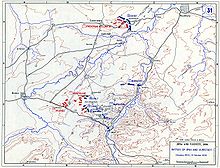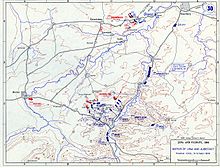Battle of Jena–Auerstedt
Battle of Jena and Auerstedt
Part of: Fourth Coalition War

Battles map
Fourth Coalition War (1806/07)
Schleiz - Saalfeld - Jena and Auerstedt - Lübeck - Wielkopolska - Czarnowo - Golymin - Pułtusk - Dirschau - Prussian Eylau - Ostrolenka - Stolp - Gdansk - Kolberg - Guttstadt - Heilsberg - Friedland
The Battle of Jena and Auerstedt (also Doppelschlacht bei Jena und Auerstedt; or Auerstädt in older sources) took place during the Fourth Coalition War on 14 October 1806 near the towns of Jena and Auerstedt.
The Prussian army suffered a heavy defeat against the French troops. Napoleon Bonaparte defeated a Prussian-Saxon corps with his numerically superior main army near Jena on October 14, 1806, while at the same time, about 25 kilometers away, Marshal Davout and his corps were able to defeat the numerically superior Prussian main army under the Duke of Brunswick near Auerstedt. In older sources, instead of "Battle of Jena and Auerstedt", it is also called "Double Battle of Jena and Auerstedt". Both terms do not reveal that both the French and the Prussians had virtually no knowledge of the battles, which ran parallel in time. However, neither battle can be considered to the exclusion of the other.

Slaughter situation on 14 October at 2 pm

Slaughter situation on 14 October at 10 a.m.
Previous story
After the overwhelming victory over the allied armies of Russia and Austria at the Battle of Austerlitz on 2 December 1805, Napoleon increasingly dictated European policy and division. The Peace of Pressburg on 26 December 1805, which Emperor Francis II was forced to conclude, involved large territorial losses by the Habsburgs in southern Germany and Italy in favour of France and its allies such as Bavaria, Baden, Württemberg and the Kingdom of Italy. In Napoleon's reorganization of Europe, Bavaria and Württemberg were upgraded to kingdoms, while Baden, Hesse, and Berg became grand duchies. Napoleon left his troops in Central Europe and in Italy to emphasize his policy with military pressure. Napoleon's brothers Joseph and Louis were made kings of Naples (March 1806) and Holland (May 1806), respectively. Napoleon's brother-in-law Murat became grand duke of Berg. Under French protectorate, the Confederation of the Rhine was then formed on July 26 by 16 German principalities leaving the German Empire. Under Napoleon's pressure, Francis II resigned the imperial dignity of the Holy Roman Empire on August 6, 1806. The Holy Roman Empire of the German Nation ceased to exist.
Napoleon also exerted more and more influence on Prussian politics. In order to achieve Prussia's neutrality in the conflict with England, Austria and Russia, Napoleon offered the Electorate of Hanover as a pledge. When the French 1st Corps under Marshal Jean-Baptiste Bernadotte, who had been administering Hanover since June 1804, violated the border of the Prussian Margraviate of Ansbach on its way south on Napoleon's orders and crossed it, the abandoned Hanover was occupied by the Prussians and the Russians were allowed to march through Prussian territory. Prussia actually wanted to demand that Napoleon separate the crowns of France and Italy, as well as recognize the neutrality of Switzerland and the Netherlands. After the Battle of Austerlitz, however, this did not come to pass. The Prussian cabinet minister Haugwitz, who also had secret instructions from his king to keep the peace, agreed to an alliance treaty with France at Schönbrunn, where Napoleon resided, on December 15, 1805. This also provided for the surrender of Prussian possessions such as the Margraviate of Ansbach to Bavaria, which was allied with France, and the Duchy of Cleves and the Principality of Neuchâtel to France. In return Prussia was to receive Hanover and for Ansbach a small region near Bayreuth.
The possession of Hanover, which was actually in personal union with Great Britain, posed a problem for Prussia, since it would have placed itself against England. Prussia tried to present the possession only as a temporary administration or pledge until it could really receive Hanover in a peace treaty, and also wanted to have the land cessions postponed until then. However, in a renegotiation Napoleon forced Prussia to accept stricter conditions than before, with threats of war. The territorial cessions were to be made more quickly, Ansbach being handed over to Bavaria without any consideration, and the county of Valangin falling additionally to France. In this treaty of Paris on February 15, 1806, Hanover was to be appropriated with full sovereignty, and Prussia was to close all ports to English ships. This resulted in England and Sweden declaring war on Prussia and fighting and destroying the Prussian merchant fleet. With further pressure, Napoleon also managed to force Prussian Foreign Minister Hardenberg, whom he considered an enemy, out of office and had him replaced by Haugwitz. Shortly thereafter, Napoleon demanded the Prussian abbeys of Essen, Werden, and Elten for the newly created Grand Duchy of Berg, which had been formed from the duchies of Cleves and Berg, and - ignoring Prussian protests - annexed the fortress of Wesel. When the Confederation of the Rhine was founded shortly afterwards, Napoleon brought up the idea of a North German Confederation under Prussian leadership, even with an imperial crown for the Prussian king. Neither was Prussia's effort particularly supported, nor were there any great successes.
After the death of William Pitt, who was a staunch opponent of Napoleon, the more moderate Whig Charles Fox took over as British Prime Minister, and France and England entered into new, secret peace negotiations. When Prussia learned that France had proposed to England that Hanover be returned to the United Kingdom, it mobilized its military in early August. Prussia's ultimatum of 26 August 1806 that Napoleon should return his troops across the Rhine by 8 October finally prompted the latter to act.
Prerequisites
The Prussian army had not developed significantly since the Silesian Wars. It clung to the traditional order of line tactics, divided the troops into divisions only shortly before the war, and was not accustomed to the interaction between modern general staff and operational command. The experiences of the campaigns on the Rhine (1792-1795) and in Poland (1794/1795) had been largely displaced by the old general staff, especially since the Prussian army had then encountered a revolutionary army in tactical-strategic transition in the West. Moreover, in Prussia the officers of the younger generation still possessed little influence in the army. Moreover, the Prussian army was a standing army of the old type, in which officers were rarely promoted by merit but usually by seniority (anciennity). Also, the equipment was deficient, as many items were sparse, as a result of company economy.
The Napoleonic army, on the other hand, was experienced in war and highly motivated by previous victories. It consisted of conscripts drafted annually, although Napoleon had to allow numerous exemptions from conscription in deference to the French upper middle classes ("notables") who supported his rule, reminiscent of "exemtions" (exemptions from conscription) in the Prussian cantonal system. Tactically, these troops were up to their time, flexibly combining rifle tactics (cf. infantry, volley), column tactics, and line tactics. A more flexible baggage and supply system made the French army more mobile and faster. Admittedly, it often degenerated into looting, which placed a heavy burden on the civilian population. French subaltern officers had no horses; soldiers had winter coats instead of tents. The French requisitioned locally in exchange for receipts; the Prussians operated with a rations van. Napoleon's soldiers were thus not hampered by an extensive supply train and were able to achieve much faster marching speeds.
Questions and Answers
Q: When was the Battle of Jena-Auerstadt fought?
A: The Battle of Jena-Auerstadt was fought on October 14, 1806.
Q: Which war was the Battle of Jena-Auerstadt a part of?
A: The Battle of Jena-Auerstadt was part of the War of the Fourth Coalition.
Q: who were the two sides that fought at the Battle of Jena-Auerstadt?
A: The two sides that fought at the Battle of Jena-Auerstadt were the French and the Prussians.
Q: Who emerged the winner at the Battle of Jena-Auerstadt?
A: Napoleon of France emerged as the winner of the Battle of Jena-Auerstadt.
Q: What did Napoleon conquer as a result of his victory at the Battle of Jena-Auerstadt?
A: As a result of his victory at the Battle of Jena-Auerstadt, Napoleon went on to conquer Prussia.
Q: What was the impact of Napoleon's victory at the Battle of Jena-Auerstadt?
A: Napoleon's victory at the Battle of Jena-Auerstadt served as a major turning point in the War of the Fourth Coalition and solidified his dominance as a military leader in Europe.
Q: When did the War of the Fourth Coalition come to an end?
A: The Treaty of Tilsit, signed on July 7, 1807, marked the end of the War of the Fourth Coalition.
Search within the encyclopedia